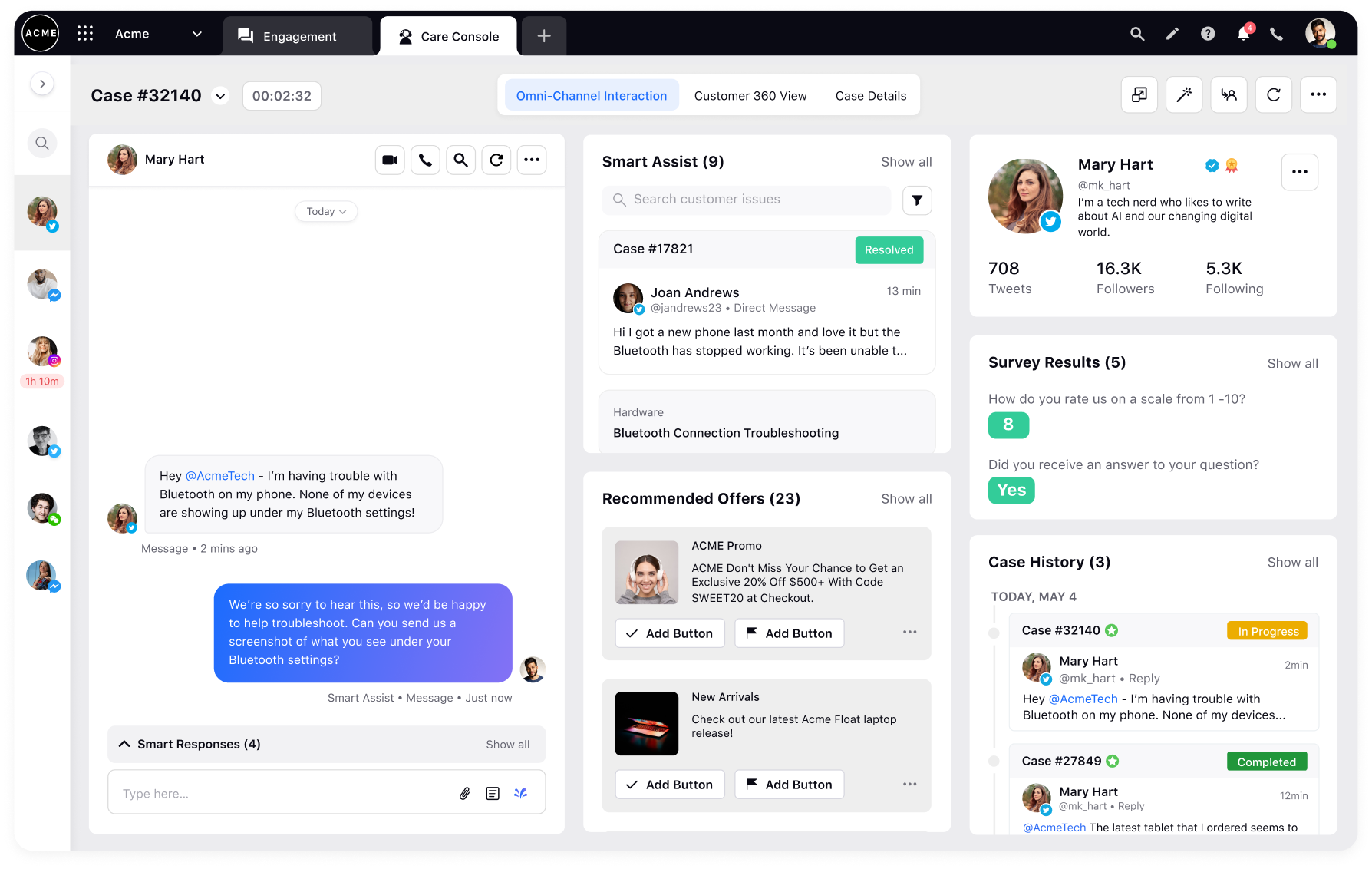AI-Powered Transformation: Customer Service in 2024 and Beyond
Technology March 5, 2024, Comments Off
Automation has become a driving force in transforming how services are delivered to users. With the rapid advancement of Artificial Intelligence (AI) solutions, users can now seamlessly perform tasks such as booking restaurant reservations, ordering food, purchasing movie tickets, reserving hotel rooms, and even scheduling clinic appointments. The customer service industry, in particular, is experiencing a significant surge in momentum, primarily due to the disruptive impact of Artificial Intelligence.
AI for Customer Service
A recent study revealed that 42% of B2C customers expressed a greater interest in purchasing after experiencing excellent customer service. Conversely, 52% of customers stopped purchasing due to a single disappointing customer support interaction. While AI technology is hailed as a solution that enables real-time self-service for customer support platforms, there is also a prevailing misconception that AI-assisted responses will entirely replace the need for human agents.
The excitement surrounding AI is primarily rooted in its two major capabilities –
a) Machine Learning
Machine learning involves the use of powerful computing systems that analyze vast amounts of data to learn from it. Examples of AI machine learning processes include Facebook Messenger, which provides suggestions and manages spam folders.
b) Natural Language Processing (NLP)
NLP enables AI software to process and interpret spoken or written messages. Popular examples of NLP include virtual assistants like Siri, Cortana, and Alexa.
The convergence of these capabilities forms the foundation of AI in customer service, empowering businesses to provide efficient services to their customers.
The Diverse Applications of AI in Customer Service
Following are numerous applications of customer service software in 2024:
1. AI as a Brand Messenger
In the last five years, the prevalence of messaging apps has surged, with users relying on them not only for personal communication but also for engaging with brands. AI-powered, customized, real-time messaging bots offer businesses an incredible opportunity to connect with both new and existing customers, creating a unique revenue stream. Facebook Messenger, leveraging powerful chatbots with cognitive capabilities, serves as an exemplary illustration of this trend.
2. AI for Well-Informed Actions
AI is rapidly disrupting customer service by multi-tasking and responding quickly to automated queries. AI-assisted automation can generate responses with accuracy and speed beyond human capabilities. According to a Forrester report, the customer service industry is entering an era of automated, smarter, and more strategic customer support. AI not only makes self-service interfaces more intuitive but also anticipates specific customer needs based on context, chat history, and preferences.
3. One-time Investment for Timeless Merits
Cost-saving is a top priority for businesses today, especially in the call center industry. Hiring and training customer service staff, along with establishing physical infrastructure, can be expensive and time-consuming. In contrast, AI-enabled customer service platforms automate responses, reducing costs and time. Platforms like Watson act as pre-programmed intelligent systems with domain-specific knowledge, requiring only one-time training. Updates or changes in processes can be implemented by reconfiguring the software, eliminating the need for extensive retraining of support staff.
4. AI-Controlled Multi Channels of Support
AI is not limited to providing direct assistance to customers but can also guide the customer service process. Intelligent support systems can direct customers toward specialized support channels in complex situations. For example, if a telecommunication customer service agent is unable to resolve technical network issues, an AI-powered chatbot can identify the problem and shift customers to the appropriate support channel. This comprehensive approach brings balance to the support system, ensuring efficient solutions for customers and relieving overloaded support channels.
5. AI Machine Learning for Extra Support
AI functions indirectly to support both customers and service agents. By learning from recurring issues, machine learning enables customer support to anticipate challenges that chatbots may struggle to address. Empower your workforce through analytics and technology, fostering proactive contributions such as optimizing conversational IVR menus based on customer patterns. Call centers equipped with AI machine learning capabilities can suggest accurate solutions, contributing to the efficiency of both agents and customers.
6. Precise Predictions and Insights
AI’s ability to analyze vast datasets allows businesses to make precise predictions about customer preferences. Just as e-commerce platforms like Amazon predict customer preferences based on browsing history and interactions, AI in customer support can suggest the next best action for agents. This is particularly beneficial in businesses with diverse product ranges and numerous customer interactions, providing valuable guidance to new agents.
7. Uninterrupted Momentum of Service
AI-powered customer service offers fast responses and operates without time constraints or holidays. This ensures uninterrupted customer support, eliminates wait times, enables quick resolutions, and enhances overall customer satisfaction. The consistent support provided by AI contributes to improved service quality, commitment levels, and increased brand reputation.
8. Artificial Intelligence Offers Reliability
As customer expectations evolve, businesses strive to provide reliable and flexible assistance. AI, with its cognitive knowledge base, enhances customer interactions by providing a level of reliability that is challenging for human counterparts to achieve. Chatbots, in particular, offer frictionless communication, quick and accurate assistance, and the ability to escalate inquiries when necessary. AI establishes a connection of trust and reliability between businesses and customers, contributing to improved brand reputation
Real-world Examples of AI in Customer Service
1. AI Chatbots
AI chatbots, powered by Large Language Models like OpenAI’s GPT, offer immediate responses to common customer queries. They can fetch relevant information from a knowledge base, improving the customer experience.
Expert Advise: Consider integrating conversational IVR (Interactive Voice Response) systems to provide seamless transitions between chatbots and phone interactions, offering customers a convenient and efficient support experience across multiple channels.
2. Agent Assist
AI uses natural language processing to suggest responses based on previous interactions, knowledge bases, and user data. Agents have control over the suggestions, enhancing efficiency and maintaining human oversight.
3. Automate Data Entry
AI can automate data entry by auto-filling forms during conversations, reducing the time spent on manual data entry by support agents.
4. Intelligent Triaging
AI can summarize conversations and perform sentiment analysis, helping support agents prioritize issues based on severity, urgency, and sentiment. This improves customer service efficiency.
5. Multilingual Support
AI’s automatic translation capabilities can facilitate real-time translation between agent and customer messages, enabling support in multiple languages.
6. Insights from Unstructured Data:
AI excels at interpreting unstructured data, such as survey responses, through sentiment analysis. This provides businesses with valuable insights into customer feelings and preferences.
Conclusion
The automation revolution powered by AI is reshaping the landscape of customer service. From chatbots and agent assistance to automating data entry and providing insights from unstructured data, AI offers a myriad of benefits for businesses aiming to enhance customer experiences and streamline support processes. While challenges such as privacy concerns and implementation difficulties exist, the potential rewards in terms of cost savings, data-driven insights, and improved customer satisfaction make AI an indispensable tool for the future of customer service.
As we move into 2024, the integration of AI in customer service continues to evolve, with businesses adopting a strategic approach that combines the strengths of AI and human agents. The rise of AI-assisted human agent models exemplifies the maturity and sophistication of AI applications in customer service. With careful implementation, continuous refinement, and a focus on addressing challenges, businesses can harness the full potential of AI to create a customer service paradigm that is efficient, reliable, and future-ready.
